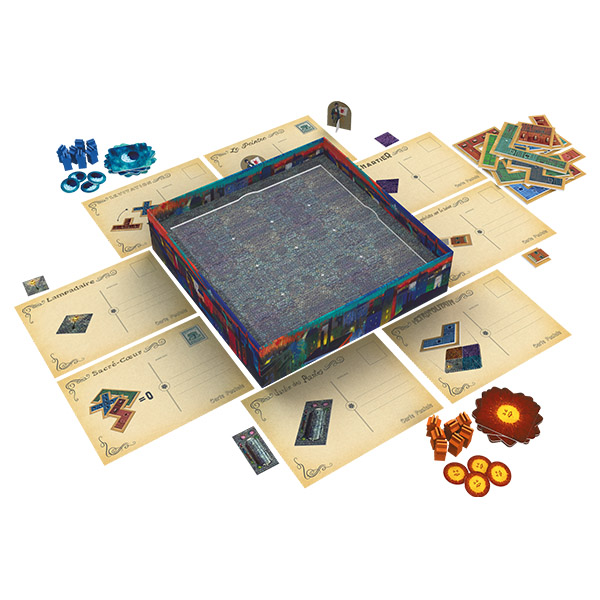Furnace remains one of my favorite engine-building games – if anything, I’ve come to like it more and more the more I’ve played it. The rules are short, and I think very straightforward, especially if you’ve played any sort of engine-builders before (like Gizmos), while you can play the game in an hour even with four people, and in a half hour or even a little less with two people if they know the game already. It even has a useful ‘dummy’ player called the Agent to use in two-player games that at least creates a little competition for token placements. The expansion Furnace: Interbellum came out in 2022, and it is a mixed bag of added features I really like along with some extra complexity that I think the game doesn’t need. (You can get it on Amazon but it’s cheaper on specialty sites like Boardtopia.)
Interbellum does have enough good stuff to justify getting it, and although it doesn’t strictly contain modules, you can definitely pick and choose what to include. There’s really one piece here I didn’t care for, and you can very easily omit it from your games – the business school cards and manager tiles. Furnace’s main market for acquiring cards has a row of 6-8 Company cards, depending on your player count, on which players will place their bidding tokens in the auction round. You can add two or three business-school cards to the end of that market, and in each round, you place a manager tile on each of those cards. Players may place bidding tokens on those as well; if they win the auction, they get the manager token, and if they lose, they get compensation as usual, although with the b-school cards they get to choose among two options. You keep the manager token for just one round, adding it to any Company or starter card in your production line to do things like repeat the card’s actions or take a conversion action for free. It’s a lot of extra cognitive work to incorporate these into the game – you lose the simplicity of bid on cards, add cards to your production line, gather resources, and fire up the engine – but it doesn’t make the game more enjoyable.
Interbellum adds a variable bidding token that I also didn’t find that useful, and if you don’t use the added b-school cards you probably can’t use this token anyway. The token can be worth any value you’d like, but you must pay the value in coal – if you want to bid 6, for example, you have to pay 6 coal tokens when placing the bid. (The game’s standard tokens are valued 1 through 4.) It’s good to have a use for extra coal, as it’s pretty easy to end up with more coal than you can ever use, but this overcomplicates the elegant auction aspect of the game.
Now for the good stuff, starting with the addition of tokens for a fifth player – which, to be clear, I haven’t tried, but I’m on board with it in principle. The game also adds new Capitalist cards, the starting powers given to players to make it slightly asymmetrical, including one that replaces the most powerful Capitalist card from the base game, which gives its owner an extra value-2 bidding token. The new version of this card requires that the player place that token during a regular bidding turn, rather than giving them an extra fifth bidding turn after everyone else has gone. It also adds some new starter cards and a whole extra deck of 24 new Company cards, with instructions on how to integrate them with the base game’s deck (you remove 24 cards from it based on the background images). These cards bring a slew of new conversion and sale possibilities for turning your resources into other resources or into coins, which are the game’s victory points, along with immediate powers marked by a lightning symbol that occur either on purchase or on upgrade. This is good complexity – it works within the confines of the original game, making it more involved but not more difficult.
The expansion also adds a solo mode that gives the Agent coins over the course of the game, allowing it to win cards if it has the highest bid token or take compensation if it has a lower one. There are multiple Agent personalities, such as the Coal Baron, that change how it places its bid tokens and how it receives coins. I completely get it for the solo mode, but found it didn’t work well enough to be competitive in the two-player mode, and unlike the instructions for everything in the original game, the instructions on the Agent cards are quite confusing – and I can see from the discussion forums on BoardGameGeek that I’m not the only one who thought this.
I don’t buy or even trade for many expansions, because I have too many games anyway and there are very few games I play often enough to justify getting them. Ticket to Ride, Carcassonne, and Wingspan are obvious exceptions, but if it doesn’t enhance the original I’m probably not interested. Furnace: Interbellum does do that, and you could probably get it all in the original box if you ditch the insert, especially all of the new cards. You’re also paying for some stuff that, in my opinion, makes a great game a little too complicated for its own good.
